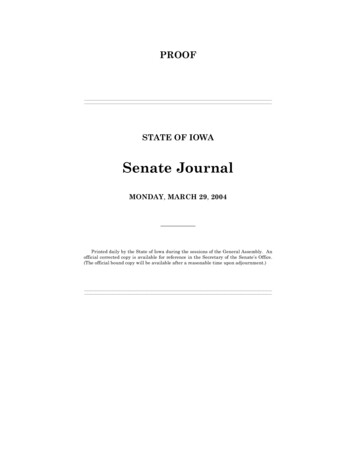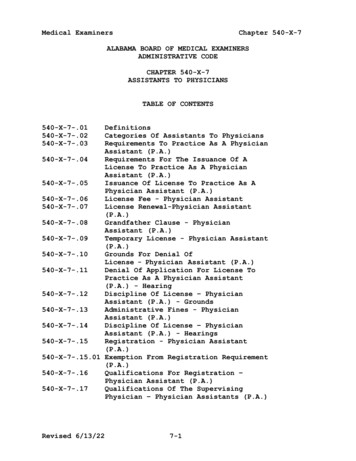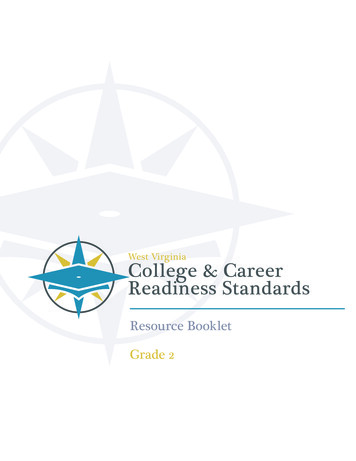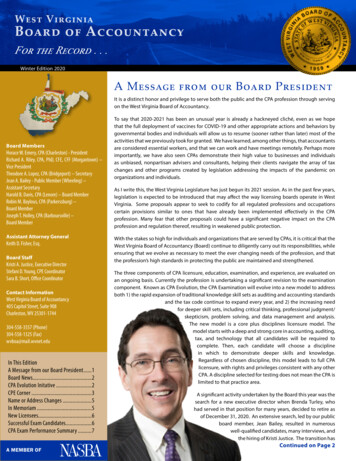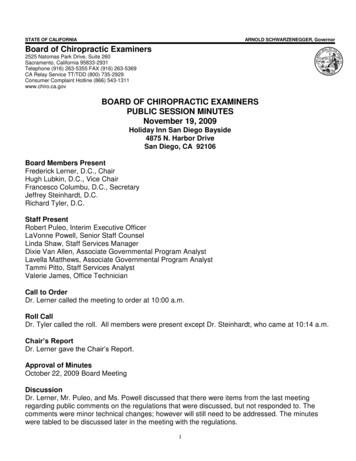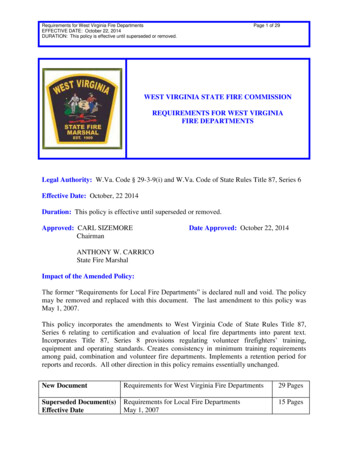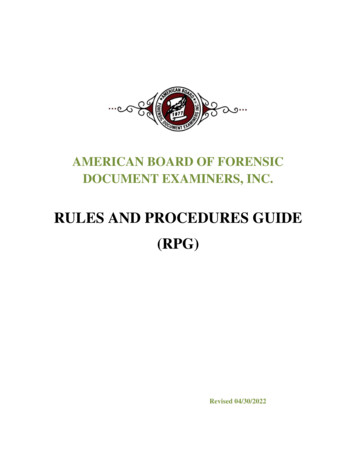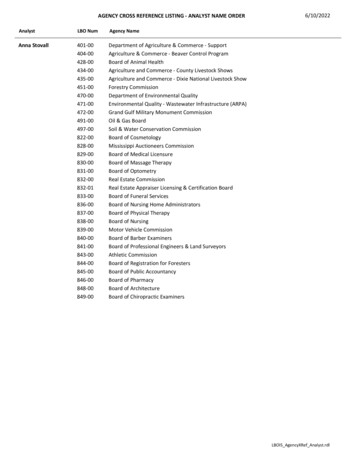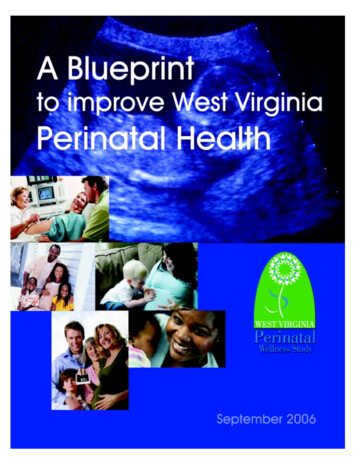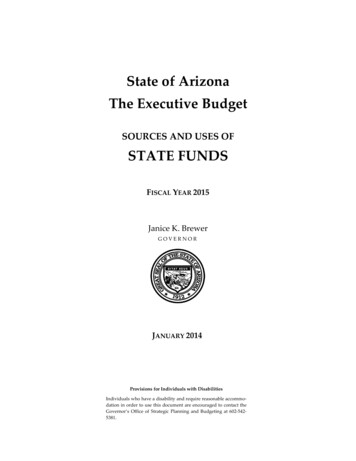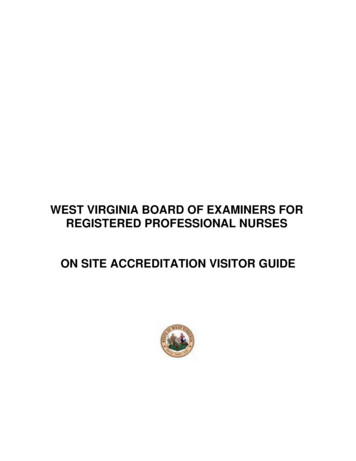
Transcription
WEST VIRGINIA BOARD OF EXAMINERS FORREGISTERED PROFESSIONAL NURSESON SITE ACCREDITATION VISITOR GUIDE
Table of ContentsWEST VIRGINIA BOARD OF EXAMINERS FOR REGISTERD PROFESSIONAL NURSES . 2MISSION . 3GOALS AND OBJECTIVES . 3STATUTORY HISTORY. 3ACCREDITATION VISIT PURPOSE, SCHEDULING AND RESPONSIBILITIES . 5CONFIDENTIALITY OF ACCREDITATION INFORMATION . 6TRAVEL EXPENSES . 7WEST VIRGINIA CODE OF LEGISLATIVE RULES . 8ON-SITE ACCREDITATION . 40ACCREDITATION SELF-EVALUATION . 41POTENTIAL INTERVIEW QUESTIONS FOR THE ON-SITE VISIT . 51SIGN-IN SHEET FOR FACULTY MEETING . 58SIGN-IN SHEET FOR NURSE ADMINISTRATOR MEETING . 59SIGN-IN SHEET FOR STUDENT MEETING . 60SIGN-IN SHEET FOR SITE VISIT MEETING . 61WEST VIRGINIA BOARD OF EXAMINERS FOR REGISTERDPROFESSIONAL NURSES2
MISSIONThe West Virginia Board of Examiners for Registered Professional Nurses established topromote and protect public health, safety, and welfare through the regulation of registeredprofessional nurses and dialysis technicians.GOALS AND OBJECTIVESIn accordance with WV Code §30-7-1 et seq. the Board will:1.Function according to the Code of Conduct.2.Be accessible to the public.3.Assure the quality of the basic education process for registered professionalnurses.4.Assure the quality of the basic education process for the dialysis technician.5.Assure initial and continuing competence of the registered professional nurse.6.Assure initial and continuing competence of the dialysis technician.7.Define the scope of practice for registered professional nursing and advancedpractice nurses.8.Define the scope of practice for the dialysis technician.9.Provide a disciplinary process.10. Review issues related to the nursing shortage.11. Support the mission of the West Virginia Center for Nursing12. Support the nurse health program, WV Restore.STATUTORY HISTORYThe Board of Nursing is mandated under Chapter 30 of the West Virginia Code to:1.2.3.4.5.6.7.8.Review and evaluate National Council of State Boards of Nursing registerednurse licensure examination scores of each program in relation to the standard.Conduct on-site visits to at least two nursing education programs annually.Issue licenses to qualified persons in a timely fashion.Provide educational information to registered nurses, dialysis technicians,nursing education programs, employers and the public related to:a.Disciplineb.Orientation to the Boardc.Advanced Practiced.Licensuree.Practice Issuesf.Conditions that affect an individual’s safe practiceProcess complaints from health care professionals and the public in a timelyfashion.Respond expeditiously to public requests related to Board operations.Evaluate regulatory solutions to address borderless health care delivery.Provide and evaluate the effectiveness of the nurse health program3
9.10.11.WV Restore.Provide multiple modes of communication opportunities with the Board.Establish a Practice Committee for discussion of practice issues as needed.Seek legislative authority to obtain criminal background checks on all newapplicants.4
ACCREDITATION VISIT PURPOSE, SCHEDULING AND RESPONSIBILITIESPurposeThe purpose of the on-site visit is to supplement the self-evaluation reportsubmitted by the nursing program so that the Board will have a clear and completepicture of the program. It is the responsibility of the visitors to clarify, verify and amplifythe data prepared by the program, to seek additional information that may be pertinentto the Board s evaluation, to assess the effectiveness of the program s activities inrelation to its own objectives, the West Virginia Code and Rules pertaining to nursingeducation programs preparing students for initial licensure, and to delineate the majorstrengths and weaknesses of the program as they relate to specific criteria.SchedulingBoard Staff sends the accreditation report with instructions as well as contactsthe Nursing Dean/Director of the nursing program to be visited to establish a date forthe on-site visit. Once the date is determined, visitors will be notified. The visit reportis due to the office four weeks prior to the scheduled on-site visit. Once received, thereport and supporting information will be sent to each visitor for review prior to thescheduled date for the visit.Visitor ResponsibilitiesEach visitor is expected to:Decline the role of visitor if she/he has previously served in the capacity ofconsultant to the program being visited;Be knowledgeable about the accreditation requirement as set forth inWest Virginia Code and Rule;Be thoroughly conversant with the self-evaluation report and supportingmaterials;Maintain objectivity during the visitation, considering each aspect of the programonly in terms of the philosophy and objectives set forth by the nursingprogram and West Virginia Code and Rule;Develop relationships that will encourage the faculty to continue self-study,evaluation and program improvement;Assume responsibility for individual activities necessary to clarify, verify andamplify aspects of the nursing education program;Contribute to the content of the visit report and participate in writing the report;Participate in final conference with the Dean/Director of the nursing educationprogram and assist in reading and interpretation of the visit report.5
CONFIDENTIALITY OF ACCREDITATION INFORMATIONAll data, observations, conversations, conclusions, reports and minutesrelating to accrediting activities of the Board are confidential. Acceptance of aninvitation to be a visitor constitutes a contractual agreement to safeguard theconfidentiality of accrediting data. Therefore, observations made during thevisit, the self-evaluation report, the visitor's report and all other communicationbetween the nursing program and the visitors are confidential.It is therefore essential that visitors do not divulge any information fromthese sources. It is also important to avoid leaving materials where they may beread by others and to refrain from discussing observations made during the visitor the findings with anyone.The final report submitted to the Board is public information. Interestedpersons may attend the Committee or Board meeting during which the report isreviewed or submit a written request for a copy of the final report.Signature of VisitorDate6
TRAVEL EXPENSESExpenses incurred by the visitor will be reimbursed by the Board based onthe West Virginia travel reimbursement policy. Vendor contracts and travelforms with receipts must be received by the Board Staff processing the travelexpenses within three (3) weeks of the visit.7
WEST VIRGINIA CODE OF LEGISLATIVE RULES§30-7-4.Board Authority and Empowerment§30-7-4. Organization and meetings of board; quorum; powers and duties generally;executive secretary; funds.The board shall meet at least once each year and shall elect from its members a president and asecretary. The secretary shall also act as treasurer of the board. The board may hold such othermeetings during the year as it may deem necessary to transact its business. A majority, includingone officer, of the board shall constitute a quorum at any meeting. The board is herebyauthorized and empowered to:(a) Adopt and, from time to time, amend such rules and regulations, not inconsistent with thisarticle, as may be necessary to enable it to carry into effect the provisions of this article;(b) Prescribe standards for educational programs preparing persons for licensure to practiceregistered professional nursing under this article;(c) Provide for surveys of such educational programs at such time as it may deem necessary;(d) Accredit such educational programs for the preparation of practitioners of registeredprofessional nursing as shall meet the requirements of this article and of the board;(e) Deny or withdraw accreditation of educational programs for failure to meet or maintainprescribed standards required by this article and by the board;(f) Examine, license and renew the licenses of duly qualified applicants;(g) Conduct hearings upon charges calling for discipline of a licensee or revocation orsuspension of a license;(h) Keep a record of all proceedings of the board;(i) Make a biennial report to the governor;(j) Appoint and employ a qualified person, who shall not be a member of the board, to serve asexecutive secretary to the board;(k) Define the duties and fix the compensation for the executive secretary; and(l) Employ such other persons as may be necessary to carry on the work of the board.The executive secretary shall possess all of the qualifications prescribed in section three formembers of the board, except that he or she shall (a) have had at least eight years of experiencein the practice of registered professional nursing since graduation from a college or university, atleast five of which shall have been devoted to the teaching in or to the administration of aneducational program for the preparation of practitioners of registered nursing, or to acombination of such teaching and administration, and (b) shall have been actively engaged inthe practice of registered professional nursing for at least five years preceding his or herappointment by the board.8
All fees and other moneys collected by the board pursuant to the provisions of this article shallbe kept in a separate fund and expended solely for the purpose of this article. No part of thisspecial fund shall revert to the general funds of this state. The compensation provided by thisarticle and all expenses incurred under this article shall be paid from this special fund. Nocompensation or expense incurred under this article shall be a charge against the general fundsof this state.§30-7-5.Schools of Nursing; Accreditation; Standards; Surveysand Reports; Failure to Maintain Standards§30-7-5. Schools of nursing; accreditation; standards; surveys and reports; failure tomaintain standards.An institution desiring to be accredited by the board for the preparation of practitioners ofregistered professional nursing shall file an application therefor with the board, together with theinformation required and a fee of fifty dollars. It shall submit written evidence that: (a) It isprepared to give a program of nursing education which meets the standards prescribed by theboard; and (b) it is prepared to meet all other standards prescribed in this article and by theboard.Instruction and practice may be secured in one or more institutions approved by the board. Suchinstitution or institutions with which the school is to be affiliated shall be surveyed by theexecutive secretary of the board, who shall submit a written report of the survey to the board. If,in the opinion of the board, the requirements for an accredited school to prepare practitioners ofregistered professional nursing are met, it shall approve the school as an accredited school. Fromtime to time as deemed necessary by the board, it shall be the duty of the board, through itsexecutive secretary, to survey all such schools. Written reports of such surveys shall besubmitted to the board. If the board determines that any such accredited school is notmaintaining the standards required by this article and by the board, notice thereof in writingspecifying the defect or defects shall be immediately given to the school. A school which fails tocorrect these conditions to the satisfaction of the board within a reasonable time shall beremoved from the list of accredited schools.9
19CSR1Policies and Criteria for the Evaluation and Accreditationof Colleges, Departments or Schools of NursingTITLE 19LEGISLATIVE RULEWEST VIRGINIA BOARD OF EXAMINERSFOR REGISTERED PROFESSIONAL NURSESSERIES 1POLICIES , STANDARDS AND CRITERIA FOR THE EVALUATION AND ACCREDITATIONOF COLLEGES, DEPARTMENTS OR SCHOOLS OF NURSING§19-1-1. General.1.1. Scope. -- This rule establishes the policies and standards criteria for the evaluation and accreditationof colleges, departments or schools of nursing.1.2. Authority. -- W. Va. Code §§30-7-4 and 30-1-4.1.3. Filing Date. -- June 4, 2009.1.4. Effective Date. -- July 9, 2009.§19-1-2. Definitions.These words and terms mean the following:2.1. "Accredited college, department or school of nursing" means a college, department or school whichmeets the requirements of W. Va. Code §30-7-1 et seq., this rule, and any other applicable laws and rules.For purposes of considering applications for licensure, the Board may recognize nursing education programsaccredited or approved by a comparable Board or other recognized authority in another jurisdiction.2.2. “Administrator employment time” means the devotion of 80% time to school administrative duties.The administrator of the nursing program's teaching responsibilities is not to exceed 6 academic semestercredits per year, no more than 3 academic credits per semester.2.3. "Associate degree program in nursing" means a program conducted by a college or university thatleads to an associate degree with a major in nursing.2.4. "Baccalaureate degree program in nursing" means a program conducted by a college or universityand leads to a baccalaureate degree with a major in nursing.2.5. "Board" means the West Virginia board of examiners for registered professional nurses.2.6. "Clinical Preceptor" means a registered professional nurse who:10
2.6.a. is currently licensed as a registered professional nurse in good standing in the state in which heor she is providing the preceptorship with education preparation at or above the level for which the student ispreparing;2.6.b. has a minimum of 2 years of experience as a registered professional nurse providing directpatient care during the 5 years immediately preceding the date of the written agreement;2.6.c. has a philosophy of health care congruent with that of the nursing program; and,2.6.d. has current knowledge of nursing practice at the registered professional nurse level.2.7. "College", "Department" or "School" mean a nursing education unit charged with responsibility toprepare its graduates for practice as registered professional nurses, qualified to meet licensing requirements inWest Virginia. This nursing education unit may have multiple programs and may be structured in auniversity, college or hospital.2.8. "Credit hour" means that credit assigned for 1 hour of lecture per week, or 2 to 4 hours of lab perweek, per semester.2.9. “Curriculum” means a planned nursing educational experience based on the philosophy, mission,goals and outcomes of the nursing education program. The curriculum will include clinical assignments tomeet the objectives of each nursing course.2.10. “Diploma program" means a program which is usually, but not necessarily, conducted by a hospitaland leads to a diploma in nursing.2.11. “Distance education” means a formal educational process in which the majority of the instruction ina course/program occurs when instructors and students are not physically in the same location. Theeducational process may use various methodologies for communication, instruction, and evaluation.2.12. “Generic Masters degree program” means a program conducted by a university and leads to amasters degree in nursing for individuals preparing for initial licensure as a registered professional nurse.2.13. "Governing organization" means the university, college, or other organization of which the nursingeducation unit is an integral part.2.14. "Graduation" means the candidate has satisfied all requirements of the college, department orschool of nursing granting the diploma or degree.2.15. “New program” means any education program planning to prepare individuals for initial licensurethat has not been accredited by the Board. This includes but is not limited to diploma, associate,baccalaureate, generic masters, second degree programs, accelerated programs, cohorts, sites, distanceeducation through technology, Internet or web-based programs.2.16. “Part-time faculty” means faculty employed by the nursing education program in a position withfewer hours than the organization's definition of full-time faculty status.2.17. "Provisionally accredited college, department or school of nursing" means a college, department orschool of nursing which either has been temporarily approved but has not been in operation long enough toqualify for full accreditation, or one which fails to meet the requirements of the law and of the Board, and has11
received notification of its deficiencies.2.18. "Recommendations" means suggestions for the guidance of colleges, departments or schools ofnursing in the development of their programs.2.19. "Recommendation for admission to the licensure examination for registered professional nurses"means a written statement required in order to take the license examination. The applicant must berecommended to the Board by a faculty member of the program. This recommendation is based onsatisfactory completion of the program.2.20. “Renewal of accreditation” means continuation of accreditation based on survey visits, conferences,correspondence, and contents of the annual report during the reporting period and is granted for a time perioddetermined by the Board.2.21. "Requirements" means mandatory conditions which a college, department or school of nursing mustmeet in order to be accredited.2.22. “Scheduled on-site visit” means the on-site accreditation visit occurring as part of the ongoingaccreditation process of the nursing education unit.2.23. “Standards” means a standard prescribed by the Board for educational programs preparing personsfor licensure to practice registered professional nursing as per §30-7-7.(b).§19-1-3. Purposes of Accreditation.3.1. The purposes of accreditation include:3.1.a. Protection of the public through evaluation of pre-service professional nursing educationprograms in terms of the criteria set forth in this rule;3.1.b. Improvement in the quality of nursing service through the improvement of professionalnursing education;3.1.c. Guidance of prospective students in the selection of approved professional nursing educationprograms; and3.1.d. Assurance of eligibility to take the state licensing examination and to apply for state licensureto graduates of state accredited nursing programs.§19-1-4. Application for Legal Accreditation.4.1. The application fee for establishing a new program and to receive legal accreditation of aprofessional nursing education program and initial on-site visit is fifty dollars ( 50). A governing institutionthat plans to establish a new nursing education program for the preparation of practitioners of registeredprofessional nursing shall complete and submit such application for accreditation to the Board a minimum of6 months in advance of the expected opening date:4.1.a. a letter of intent identifying the governing institution, the type of nursing education program,and the status of approval from accrediting bodies and state agencies.4.1.b. a feasibility study that includes:12
4.1.b.1. the purpose of establishing the new nursing education program;4.1.b.2. an assessment establishing the need for a new undergraduate professional nursingprogram;4.1.b.3. statement of the availability of health care agencies, educational facilities and practicesites with sufficient clinical learning experiences throughout the lifespan to support the program. Letters ofcommitment and contract proposals from the clinical facility are accepted documents for inclusion todemonstrate meeting the standard;4.1.b.4. enrollment projections and identification of potential students;4.1.b.5. determination of demand for graduates of specific proposed program in geographicalarea;4.1.b.6. submission of the proposed initial budget with assurance of adequate financial resourcesto support the implementation and continuing program including submission of the proposed initial budgetand continuing budget;4.1.b.7. availability of qualified faculty for theoretical and clinical instruction;4.1.b.8. timeline for planning and implementation of the proposed program;4.1.b.9. impact on existing nursing programs within a 50 mile radius of the proposed program;4.1.b.10. organizational structure of the governing institution and placement of proposed nursingeducation program within the overall organization.4.1.c. documentation that demonstrates the potential to meet all standards identified in this rule;4.1.d. verification that a qualified nursing program administrator meeting the requirements of thisrule is employed to develop the nursing program;4.1.e. verification of availability of qualified nursing faculty to support the proposed numbers ofstudent admissions to the new nursing education program; and4.1.f. a curriculum plan that complies with the standards identified in §19-1-14.4.2. A survey may be conducted to amplify, clarify, and verify information in the application.4.3 If all standards for accreditation are met, the program shall receive provisional accreditation.4.4. Following receipt of the first calendar year report of performance of graduates on the nationallicensure examination, the Board shall conduct a survey to determine if all standards for approval of a nursingeducation program have been met. The Board may:4.4.a. grant full accreditation if standards of a nursing education program are met;4.4.b. continue provisional approval and provide to the governing institution and nursing programadministrator a written notice of deficiencies that establishes a reasonable time, based upon the number and13
severity of deficiencies, to correct deficiencies.§19-1-5. Accreditation of Education Unit.5.1. Visits and surveys. The Board, through its executive secretary and staff or other qualified persons,shall periodically survey all nursing education programs accredited by the Board, including all satellite sites ofany program.5.2. Maintenance of accreditation standards. The nursing education unit shall maintain accreditationstandards as set forth in this rule. The nursing education unit shall submit to the Board a copy of the nationalaccreditation report, recommendations and final decision for each national accreditation visit once received bythe program within 10 days of the program's receipt of the report.5.3. Program visits, in addition to regularly scheduled visits, shall be conducted more frequently if:5.3.a. there is a concern regarding the school's compliance with standards for nursing educationprograms;5.3.b. the director of the nursing program changes;5.3.c. a major curriculum change is proposed; and/or5.3.d. a complaint has been submitted to the Board.5.4. Accreditation of an existing program when ownership and control are changed. When a governingorganization contemplates a change of ownership and control of a program, it shall send notice of theintended change to the Board 90 days prior to the effective date of the intended change. The owner orgoverning organization expecting to assume responsibility for the program shall immediately makeapplication for accreditation. If the Board is satisfied the owner or governing organization which will beresponsible for the new program meets the criteria for accreditation and will comply with therecommendations of the Board, it may be provisionally accredited.5.5. Delivery of instruction by distance education methods shall enable students to meet the goals,competencies, and objectives of the educational program and standards of the Board, including supervisedclinical learning experiences.5.6. A distance-learning program shall establish a means for assessing individual student and programoutcomes.5.7. A nursing education program based outside the state of West Virginia desiring to have students in aclinical facility in West Virginia shall:5.7.a. notify the Board, in writing, 30 days in advance of the clinical learning experience for Boardapproval:5.7.a.1. name of student, including license number if student is licensed in West Virginia;5.7.a.2. name and license number of clinical supervisor;5.7.a.3. name and location of the clinical facility;14
5.7.a.4. name and license number of the nursing faculty responsible for the evaluation andoversight of the student's clinical learning experiences;5.7.a.5. submit documentation verifying the program has accreditation by the residing state boardof nursing or national nursing accreditation body;5.7.a.6. comply with all standards of the rule including those related to clinical supervision ofstudent learning experiences. The Board may request periodic report for the purpose of data collection or todetermine compliance with the provisions of this rule.5.8. Expansion of a program requires approval from the Board. Only those programs with fullaccreditation status may submit requests to the Board to initiate expansion of a program.§19-1-6. Loss of Accreditation.6.1. Loss of accreditation through failure to meet standards. The Board may withdraw accreditation fromany nursing education program which fails to meet legal and educational requirements or Board standards tothe satisfaction of the Board within a reasonable time period as determined by the Board. The program shallbe removed from the list of Board -approved professional nursing education programs. The Board shall notifythe administrator of the nursing education unit in writing of deficiencies in the nursing education program.6.1.a. Factors jeopardizing program accreditation status include but may not be limited to:6.1.a.1. deficiencies in compliance with this rule;6.1.a.2. utilization of students to meet staffing needs in health care facilities;6.1.a.3.noncompliance with school's stated philosophy/mission, program design,objectives/outcomes, and/or policies;6.1.a.4. continual failure to submit records and reports to the Board office within designatedtime frames;6.1.a.5. failure to provide sufficient variety and number of clinical learning opportunities forstudents to achieve stated objectives/outcomes;6.1.a.6. failure to comply with Board requirements or to respond to Board recommendationswithin a specified time;6.1.a.7. student enrollments without sufficient faculty, facilities and/or patient census;6.1.a.8. failure to maintain at least 80% passing rate on the licensure examination by first-timecandidates;6.1.a.9. failure of the program dean or director to document annually the currency of facultylicenses;6.1.a.10. failure to maintain adequate budget to meet the needs of the program; or6.1.a.11. other activities or situations that demonstrate to the Board that a program is not meetinglegal requirements and standards.15
6.2. Loss of accreditation through change of organization. When a program changes ownership orcontrol, the Board shall automatically withdraw accreditation. The new owner or organization shall complywith the provisions of subsection 5.3. of this rule to continue the nursing education program.6.3. Provisional accreditation for failure to meet standards. At the Board's discretion, it may grantprovisional accreditation to a nursing education program during the time in which it takes corrective action inorder to meet the accreditation standards set forth in this rule.6.4 Any professional nursing school having a 20% or higher failure rate on the national licensureexamination, shall receive a warning from the Board. If changes, correction and/or adjustment relative tofaculty, facilities, student admission, curriculum content, and/or methods of teaching are not initiated within aspecified time and such action approved by the Board, the Board may impose additional requirements orrestrictions on the program.§19-1-7. Closing of a Program.7.1. The governing organization shall advise the Board in writing of the intent to close a nursingeducation program at least 6 months prior to the planned closing date. The governing organization shallsubmit a plan for safeguarding the quality of instruction and practice during the closing period.7.2. The governing organization shall ensure that all standards for nursing education programs aremaintained and all necessary courses are taught until the last student is transferred or graduated.7.3. The governing institution shall secure and provide for the permanent custody and storage of recordsof students and graduates. The Board shall be notified of the location and method of retrieving informationfrom these records.7.4. At the Board's discretion, it may request additional information and plans for the closing of a nursingeducation program and the transfer of students and records.7.5. The Board shall automatically withdraw accreditation of the program on the day the last studentcompletes curriculum requirements of the pr
7. Define the scope of practice for registered professional nursing and advanced practice nurses. 8. Define the scope of practice for the dialysis technician. 9. Provide a disciplinary process. 10. Review issues related to the nursing shortage. 11. Support the mission of the West Virginia Center for Nursing 12.
